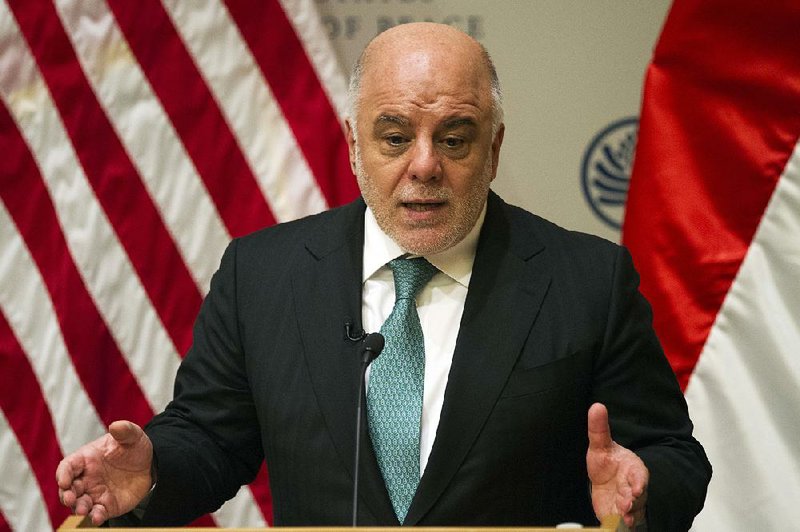WASHINGTON -- Iraqi Prime Minister Haider al-Abadi, emerging from his first meeting with President Donald Trump, said Monday that he was assured the U.S. will accelerate its support for his country's struggle against the Islamic State extremist group.
"I think they are prepared to do more" than the administration of President Barack Obama, he said.
Obama was reluctant to commit large numbers of U.S. troops to fighting the Islamic State in Iraq, but his approach, which relied on training and supporting local forces, has succeeded in pushing the militants out of much of the territory they once held.
Speaking at a Washington think tank shortly after his White House visit, al-Abadi said he got the impression that the Trump administration will take a more aggressive approach, although he did not say what that might entail.
[PRESIDENT TRUMP: Timeline, appointments, executive orders + guide to actions in first 100 days]
"I think this administration wants to be more engaged in fighting terrorism," he said. "I sense a difference in terms of being head-to-head with terrorism." He added, however, that military force is not necessarily the most effective tool. "There are better ways for defeating terrorism."
Asked whether he had seen specific Trump administration improvements to the previous administration's approach, al-Abadi said: "To be honest, I haven't seen a full plan. I know there is a plan. I haven't seen it. We have our own plan."
Defense Secretary James Mattis recently presented Trump with the outlines of a comprehensive approach to defeating the Islamic State and other extremist groups on a global scale, but specifics are yet to be worked out. Officials have indicated that the approach is unlikely to depart radically from the Obama strategy, at least with regard to the ongoing efforts in Iraq and Syria.
Al-Abadi appeared at the U.S. Institute of Peace, a federally funded think tank. The prime minister spoke optimistically of completing the recapture of Iraqi lands still held by the Islamic State. He said government forces, working effectively with Kurdish forces known as Peshmerga and supported by U.S. air power and military advisers, are on the brink of fully liberating Mosul, the northern city that has been the Islamic State's main Iraqi stronghold since 2014.
In brief remarks in the presence of reporters during al-Abadi's White House visit, Trump raised his frequently stated objections to the Iran nuclear deal negotiated by his predecessor but did not talk specifically about how he intends to support Iraq.
"One of the things I did ask is why did President Obama sign that agreement with Iran, because nobody has been able to figure that one out," Trump said. "But maybe someday we'll be able to figure that one out."
Trump said he hopes to address the "vacuum" that was created when the Islamic State claimed Iraq, and added that "we shouldn't have gone in" to Iraq in the first place.
Trump campaigned on a promise to ramp up the assault on the Islamic State and has vowed to eradicate "radical Islamic terrorism."
Trump greeted al-Abadi in the Oval Office shortly after FBI Director James Comey said the FBI and Justice Department have no information to substantiate Trump's claims that Obama wiretapped him before the election.
As reporters were leaving, al-Abadi leaned over to Trump and said jokingly, "We have nothing to do with the wiretap."
The Iraqi premier's first visit to Washington since Trump's inauguration came before Trump hosts a 68-nation meeting geared toward advancing the fight against the militant group.
During al-Abadi's last visit to Washington, the Iraqi premier worked to drum up greater financial and military support as he faced the task of rebuilding cities destroyed in the fight against the Islamic State. He also sought greater assistance to help the country confront a humanitarian crisis, with more than 4 million people displaced in the fighting.
As he departed Baghdad for the Monday afternoon meeting at the White House, al-Abadi declared in a video statement, "We are in the last chapter, the final stages to eliminate [the Islamic State] militarily in Iraq."
Al-Abadi assumed power in 2014 after Iraq's longtime prime minister, Nouri al-Maliki, was pushed out by his party for his failures to cap the surge of Islamic State fighters. At one point, the radical Sunni Muslim group ruled about a third of Iraq.
Since then, Iraq's military has seen significant military victories, with the help of an international coalition that has been assisting with airstrikes and weapons as well as a robust advise and assist operation.
The U.S. has sent about 5,200 U.S. forces to Iraq, but that number doesn't include a few thousand forces who are there on temporary duty or don't count in the military personnel accounting system for other reasons.
Information for this article was contributed by Lolita Baldor of The Associated Press.
A Section on 03/21/2017

